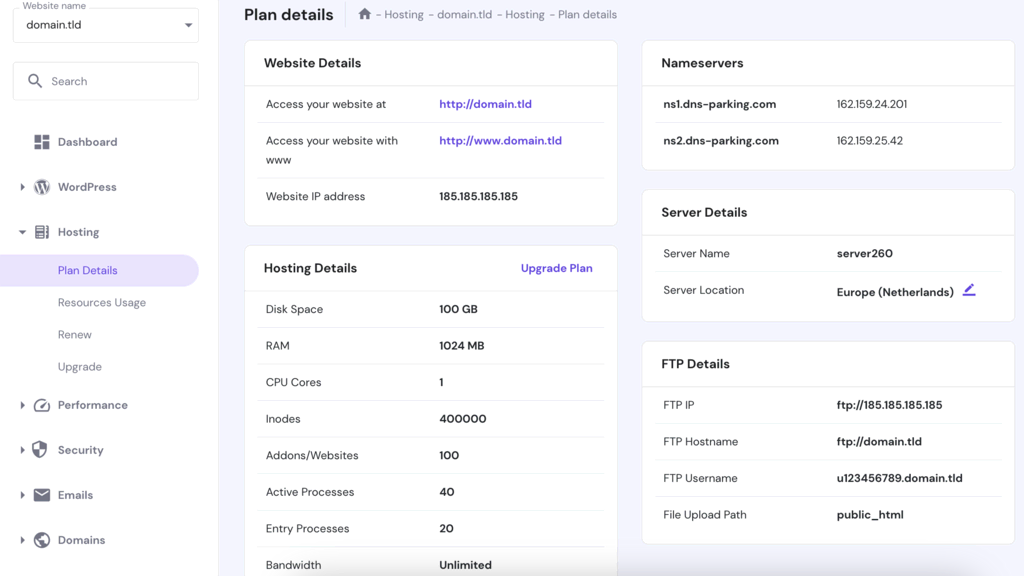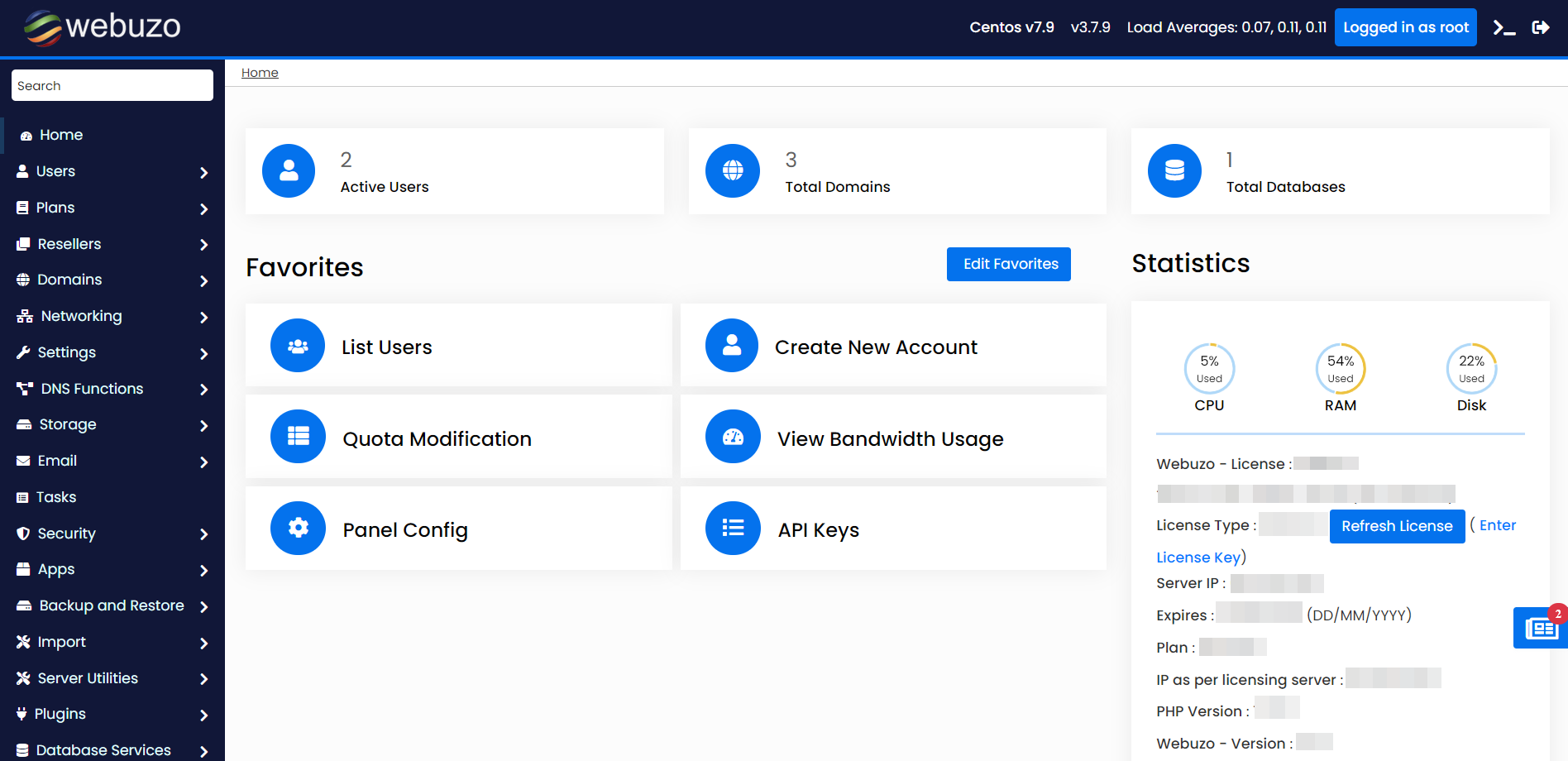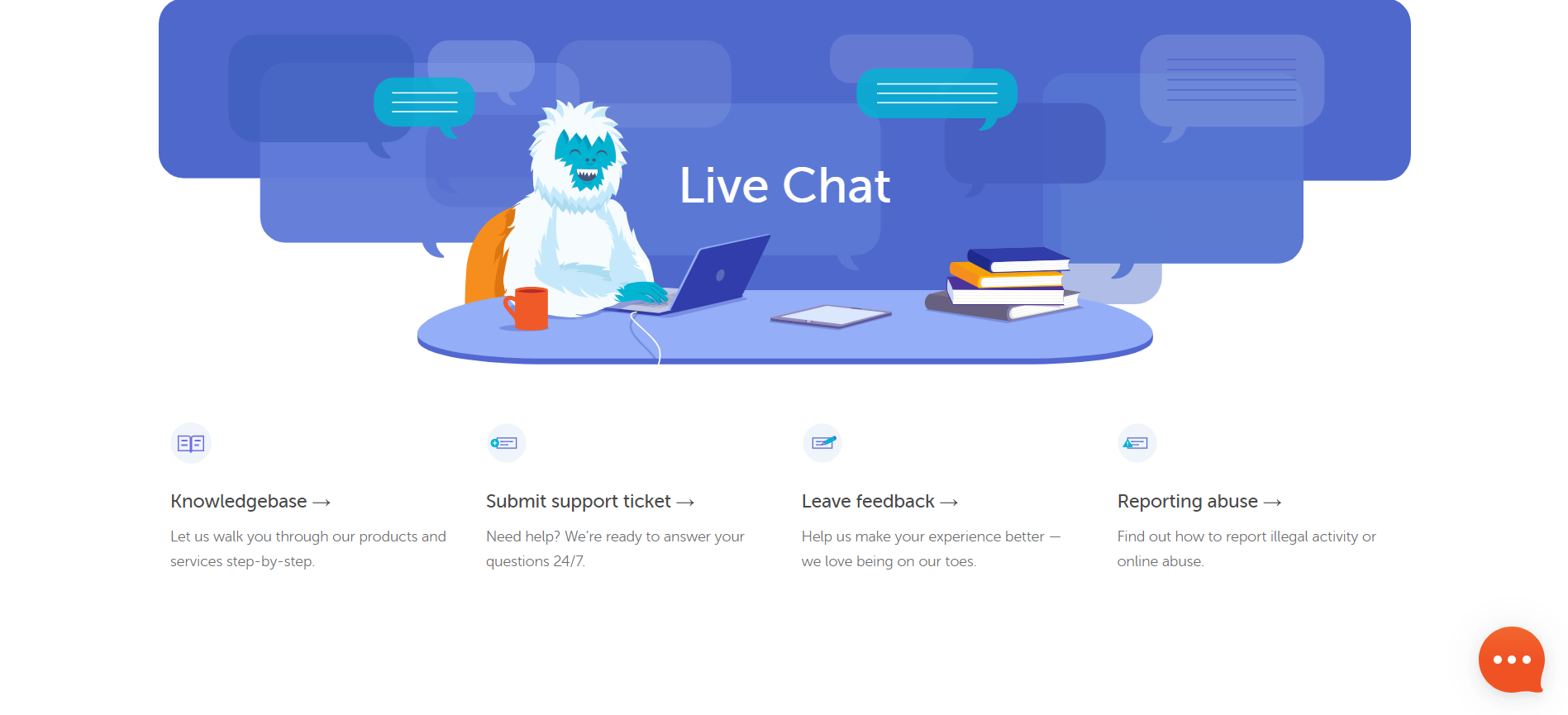Are you staring at Namecheap vs Hostinger tabs, wondering which one to trust? You’re not the only one sifting through promotional and marketing content to uncover the details that matter.
Both Namecheap and Hostinger offer the full package: domains, hosting, email, WordPress, and site builders. But under the hood, they take very different approaches. One keeps things simple and budget-friendly. The other packs in performance and support for those willing to pay a bit more.
This isn’t just a side-by-side feature list. We’ll walk through how each platform feels to use for the everyday tasks that matter the most. Like creating a new website, setting up SSL, email, and keeping your site running securely and smoothly. You’ll gain a better understanding of how Namecheap and Hostinger stack up, where they shine, and how to identify areas where they may fall short.
Namecheap vs Hostinger at a glance
Hostinger – 8.7 / 10 If speed, simplicity, and room to grow matter most, Hostinger is built for it. You get fast WordPress performance, a beginner-friendly dashboard, solid customer support, and tools like an AI website builder and staging. It’s slightly pricier, but the extra features and smoother experience could make it worthwhile, especially if you:
- Are a beginner WordPress user
- Need to manage multiple WordPress sites
- Want the best performance without much hassle
- Planning for scaling now or in the future
- Better support and performance for ecommerce
Namecheap – 7.2 / 10 Namecheap keeps things affordable and familiar. The tools don’t feel as modern or cohesive, and it’s not quite as streamlined for WordPress, but it gets the basics done for less. It’s a solid pick for hosting or domain registration if you’re:
- Seeking basic, low-cost hosting
- Stretching your hosting budget by optimizing website performance yourself
- Configuring your own VPS or dedicated server and need admin access (prepare for extras, like a control panel)
- Parking a domain you bought from Namecheap
- Looking for an easy way to manage domain nameservers
 Overall grade:7.2 |
 Overall grade:8.7 |
|
|---|---|---|
| Uptime and Availability | 8.0 | 9.2 |
| Hosting Performance | 8.2 | 9.0 |
| Hosting Security | 8.5 | 8.4 |
| Price | 8.7 | 8.8 |
| Hosting Features | 7.5 | 8.3 |
| Ease Of Setup | 8.8 | 9.0 |
| User Management | 0.0 | 8.2 |
| Customer Support | 8.0 | 8.3 |
| User feedback | 4.3/5 | 4.4/5 |
Hosting types offered
Both platforms offer various hosting types, but Namecheap takes it a step further with a ton of different options. Hostinger’s focus on managed WordPress hosting is a big distinction. To avoid comparing apples and oranges, we’re comparing the two hosts with an eye towards what matters for the majority of users:
- Easy WordPress setup and performance
- A visual website builder for non-coders
Both hosts feature plans that target a range of budgets and requirements.
 |
 |
|
|---|---|---|
| Shared hosting | ||
| Cloud hosting | ||
| WordPress hosting | ||
| Ecommerce hosting | ||
| VPS hosting | ||
| Dedicated hosting |
Although both offer a variety of hosting plans tailored to different needs, in
certain cases, one platform may prove to be more suitable.
Detailed comparison
Which is more reliable day-to-day?
 8.0
8.0
 9.2
9.2
🏆 Winner Hostinger: Leading in uptime, response time, and customer support, Hostinger proves to be the top choice.

If you’re setting up a personal site, blog, or small portfolio, uptime might feel like a non-issue. But if you’re running a business site—or planning to—reliability quickly becomes make-or-break.
Hostinger guarantees 99.9% uptime, and based on independent testing and user feedback, it tends to meet or exceed that in real-world use. Server response times are also consistently fast, which helps your site load more quickly and reduces the risk of frustrating visitors or losing sales. If you’re using WordPress or selling products online, this kind of stability is a big deal.
Namecheap, meanwhile, also promises strong uptime (even 100% on some plans). But its real-world performance can vary a bit more. It’s reliable enough for personal sites, static pages, or lightweight blogs, but shared hosting response times tend to be slower. That can present a challenge, especially if your site starts growing or you’re relying on plugins and resource-heavy ecommerce functionality.

If you’re running a blog or business site where availability actually affects your income or credibility, Hostinger’s reliability gives you more peace of mind.
Which one has better hosting performance?
 8.2
8.2
 9.0
9.0
🏆 Winner Hostinger: Exceptional and reliable performance.
Speed isn’t just about load time. It affects your SEO, bounce rate, and how trustworthy your website feels to visitors. If you’re building with WordPress or planning to grow, your host plays a big role in how smoothly everything runs.
Hostinger is built for speed from the ground up. Their infrastructure includes:
- NVMe storage (much faster than standard SSDs)
- LiteSpeed Web Servers and advanced caching
- Free CDN to serve global traffic faster
- HTTP/3 and IPv6 support (for faster, modern loading)
- WordPress-specific tools like Smart Auto Updates and Acceleration
All of this means better load times and smoother page transitions, especially for WordPress or ecommerce sites where every second counts.
Namecheap does offer solid speed for the price, especially with its EasyWP plans. They advertise a 3x boost over traditional shared hosting and include free SSL, CDN, and quick TTFB (Time to First Byte) on WordPress sites. For a basic site or blog, this can be more than enough. But Namecheap doesn’t offer the same level of performance tuning, built-in caching, or geographic server options, so it’s less ideal for heavier use cases.
Scalability keeps you forward-compatible
Both hosts let you grow beyond basic shared plans, but Hostinger makes it easier. Their cloud hosting plans are:
- Pre-optimized for WordPress
- Scalable (meaning fewer headaches when traffic spikes)
- Priced accessibly, starting under $10/month
Namecheap also has VPS and dedicated server options, but these require more hands-on setup, and they’re best suited for advanced users who are comfortable managing their own server environments.
Which host makes it easier to keep your site secure?
 8.5
8.5
 8.4
8.4
Both Namecheap and Hostinger have notable differences in their approaches to technical and operational security, as well as in their compliance with regulations.
For most people, security is less about firewalls or technical jargon and more about not waking up to a broken site, an expired SSL certificate, or missing backups. Here’s how Hostinger and Namecheap handle the basics that actually matter when you’re trying to run a website without stress.
SSL certificates and renewals
Namecheap includes 50 PositiveSSL certificates free for one year, but you’ll need to manually renew or pay for them after that. If you’re new to hosting, that can be an annoying surprise, and forgetting to renew means your site might show scary browser warnings to visitors.
Hostinger, by contrast, includes SSL for free, forever, and it auto-renews. You don’t have to think about it, which is one less fire for you to put out.
Backups and recovery
Both hosts offer free backups, but Hostinger has the edge with daily and on-demand backups on most plans. With their hosting setup, if you ever break something or get hacked, it’s really easy to roll back your site without adding to an already stressful situation.
Namecheap includes backups, too, but not always daily, depending on your plan. Some lower-tier options may require upgrading or setting up backups manually.
Spam, DNS, and extras
Namecheap provides you with additional manual tools for protection, including spam filters, VPN services, and DNS upgrades (such as PremiumDNS). If you like having switches and settings to tweak, it’s a good fit.
Hostinger takes more of a “just works” approach: malware scanning, firewalls, DDoS protection, and update automation are all running in the background. You have fewer levers to pull, but in return, you have solid security and backups with minimal effort on your part.
Key deciding factors on security for Namecheap vs Hostinger
If you’re the type of person who wants full control and doesn’t mind setting things up manually, Namecheap gives you more options.
If you’d rather the platform just take care of security basics (like backups and SSL) without you needing to lift a finger, Hostinger is the better fit.
 |
 |
|
|---|---|---|
SSL certificate |
Extensive options available |
Free SSL provided |
Additional security features |
Hotlink Protection, PremiumDNS, FastVPN |
Enhanced DDoS Protection, Web Application Firewall |
PHP versions |
PHP 5.X to PHP 8.X |
PHP version control |
GDPR compliance |
Yes |
Yes |
HIPAA compliance |
No |
No |
PCI compliance |
No |
No |
What tools and features come with Namecheap vs Hostinger?
 7.5
7.5
 8.3
8.3
Every host throws in different perks, but not all of them are what you need to get a real site up and running fast. Here’s what’s actually included at Namecheap vs Hostinger, what’s easiest to use, and where you might expect to see some extra costs pop up in the future.
Website builder
- Namecheap includes an AI-powered drag-and-drop builder with shared hosting, good for simple one-pagers or portfolios.
- Hostinger includes a full-featured AI Website Builder with modern templates, custom blocks, and one-click publishing. It’s better suited if you want a polished site without touching code.
Staging and site management
- Hostinger gives you a staging environment (ideal for testing changes before going live) and a modern, custom dashboard (hPanel).
- Namecheap relies more on cPanel or the EasyWP dashboard. Both will work, but it’s not as beginner-friendly or polished.
Domains and SSL
- Hostinger gives you a free domain for the first year with most plans, and free SSL that automatically renews.
- Namecheap includes free PositiveSSL for one year, but after that, you’ll need to pay or manually renew. Domains aren’t always bundled, especially with their lower-tier plans.
Email hosting
- Both hosts offer built-in email on most plans.
- Namecheap gives you more control with up to 30+ inboxes on lower tiers and access to spam filters and multiple webmail clients.
- Hostinger includes a few mailboxes per website, even on lower-cost tiers. It also offers the option to upgrade to business-level email for a few dollars extra a month.
Backups
- Hostinger wins here, with automatic backups on most plans, even entry-level ones.
- Namecheap includes backups, but not always automatically. On some plans, you may need to configure or upgrade to get the same level of protection.
Developer tools
Both hosts support:
- FTP/SFTP
- SSH access
- Git integration
- Multiple PHP versions
So, if you’re a developer or working with one, either provider could certainly work. Hostinger’s UX for setup and resource management is smoother, especially if you’re managing multiple sites or have limited time.
Key deciding factors among features at Namecheap vs Hostinger
If you’re a beginner trying to get a polished site online fast, with backups, staging, and a nice website builder, Hostinger packs in more value upfront.
If you’re budget-conscious and don’t mind manually configuring things but need more control, Namecheap delivers.
 |
 |
|
|---|---|---|
Free domain |
No |
Yes, for the first year |
Free SSL |
Yes, 50 free PositiveSSL for 1 year |
Yes |
Email hosting |
Yes |
Yes |
Website builder |
Yes |
Yes |
Staging environment |
No |
Yes |
FTP & SFTP accounts |
Yes |
Yes |
Git and SSH access |
Yes |
Yes |
Free backup |
Yes |
Yes, daily and on-demand |
Money back guarantee |
30 days |
30 days |
a location.
As a result in rare cases the features mentioned here can differ from the ones you see on their websites.
Namecheap vs. Hostinger: Which makes setup easier?
 8.8
8.8
 9.0
9.0
Hosting can get technical fast, but it shouldn’t feel like a blocker just to get a site online. Hosting is a complex topic that can become technical in a hurry. However, we’re focusing on everyday ease of use to get a site online and running smoothly. Here’s how each host handles the most basic of web management tasks, such as:
- Initial setup or WordPress installation
- Site migration
- Day-to-day management, especially for those new to hosting or using WordPress.
Getting started
Hostinger guides you through setup from the moment you sign up. You’ll select your platform (like WordPress), auto-install it with one click, and land on a custom dashboard (called hPanel) where everything—from email to backups—is cleanly organized.

Namecheap isn’t bad here, especially with its EasyWP plans for WordPress, but other plans use cPanel, which can feel dated and cluttered if you’re not accustomed to it. It’s perfectly adequate for setting up a website. It’s just less intuitive and polished.

Site migration
Both hosts offer free migration, which is great if you’re switching providers.
- Hostinger handles most of the process for you automatically. Users simply submit a request.
- Namecheap offers migration plugins (like All-in-One WP Migration), which work fine but require a few extra steps on your part.
Help & resources
- Hostinger provides 24/7 live chat in over 10 languages, and their knowledge base is full of step-by-step videos and guides (via Hostinger Academy).
- Namecheap also offers 24/7 live chat support and a solid help center, but live chat agents occasionally route you to tickets. If you’re the type who prefers instant help, that can be frustrating.
What this means for you
- If you’ve never hosted a site before, Hostinger gives you clearer paths, better automation, and fewer surprises.
- If you’ve used cPanel before or are migrating from a budget host, Namecheap will probably feel familiar, but you may need to poke around a bit to get going.
What about user management (and why it matters)?
 0.0
0.0
 8.2
8.2
If you’re building a single website for yourself, this section is likely to bore you. But if you’re a freelancer or agency managing client sites (or plan to resell hosting), user management features are key.
They let you:
- Give clients access to their own dashboards (without handing over your login)
- Define who can make changes, purchases, or manage domains
- Scale without messy spreadsheets or shared passwords
🏆 Winner Hostinger: An efficient and centralized user management system with easy client onboarding.
Hostinger offers a simple way to manage user roles through its hPanel, making it easy to assign access levels for teammates or clients. You can also manage purchases, services, and site settings without full admin handoff.
Namecheap’s, main hosting plans don’t offer built-in user roles or delegated access within hosting plans, at least not in a client-friendly way. Unless you’re using an included cPanel account on one of their reseller plans, you’d need to set up workarounds or share access manually.
Planning to resell hosting or a website builder? Both Hostinger and Namecheap offer APIs, but if you want to streamline client onboarding, billing, and hands-off site creation, 10Web’s white-label website builder API is worth a look.
How helpful is support when things go wrong?
 8.0
8.0
 8.3
8.3
With a good host, you likely never need support—until you do, then it’s panic mode. That’s when fast, helpful responses matter more than features or dashboards.
🏆 Winner: Hostinger (faster response, more languages)

Hostinger offers 24/7 live chat and email support, available in 10+ languages. Response times are usually fast, and they have a rich library of how-to articles and video tutorials (via Hostinger Academy) for DIY troubleshooting. As is the trend, there’s no phone support, so you won’t be able to hear a comforting voice (or hold music).

Namecheap also offers 24/7 support, with live chat and a well-stocked knowledge base. But it sometimes routes users to ticketing systems, which could mean slower help when you really need answers. On the plus side, many users praise Namecheap’s chat agents for being pleasant to deal with in general, professional, and persistent when escalations are needed.
What users are saying
Namecheap vs Hostinger: User feedback
- Hostinger users love the ease of hPanel, fast responses, and beginner-focused help but are less fond of the renewal pricing hikes and lack of phone support.
- Namecheap customers appreciate the low prices, free SSLs, and solid uptime, though some mention slow site speeds or mixed experiences with support wait times.
 |
 |
|
|---|---|---|
Phone support |
||
Live chat support |
||
Chatbot |
||
Email/ticket support |
||
Enterprise support (dedicated agent, priority support) |
Which host gives you more for your money?
 8.7
8.7
 8.8
8.8
🏆 Winner Hostinger: Offers comprehensive features and excellent value in various hosting categories.
At first glance, Namecheap looks cheaper, and for basic hosting, that’s true. But Hostinger often delivers more bang for your buck, especially if you’re building with WordPress or plan to grow.
 |
 |
|---|---|
|
EasyWP Starter $6.88/mo
1 website, 10 GB SSD storage, 50k visitors/month, free CDN and SSL, safe and secure, easy backups and restores. Value for price:8.7/10
|
Premium $7.99/mo
100 websites, 100 GB SSD storage, custom domain, WordPress multisite, 100 email addresses, themes, 100 subdomains, free SSL and CDN, automated updates and backups. Value for price:9.0/10
|
|
EasyWP Turbo $12.88/mo
1 website, 50 GB SSD storage, 200k visitors/month, more CPU and RAM, free CDN and SSL, easy backups and restores. Value for price:8.7/10
|
Business $8.99/mo
100 websites, 200 GB NVMe storage, custom domain, WordPress multisite, 100 domain-based email addresses, themes, 100 subdomains, AI tools, advanced acceleration, dedicated IP, free SSL and CDN. Value for price:9.1/10
|
|
EasyWP Supersonic $19.88/mo
1 website, 100 GB SSD storage, 500k visitors/month, enhanced CPU and RAM, free CDN and SSL, 99.99% uptime guarantee. Value for price:8.6/10
|
Cloud Startup $19.99/mo
300 websites, 200 GB NVMe storage, 200k visits/month, daily backups, managed WP, dedicated resources, advanced acceleration, object cache, free SSL and CDN, themes. Value for price:9.0/10
|
 |
 |
|---|---|
|
Stellar $4.48/mo
3 websites, 20 GB SSD, free domain, free SSL, Supersonic CDN, website builder, free migration, 30 mailboxes. Value for price:8.5/10
|
Premium $7.99/mo
100 websites, 100 GB SSD, free domain, unlimited SSL, free email, weekly backups, AI tools. Value for price:9.1/10
|
|
Stellar Plus $6.48/mo
Unlimited websites, unmetered SSD, free domain, free SSL, Supersonic CDN, autobackup. Value for price:8.6/10
|
Business $8.99/mo
100 websites, 200 GB NVMe storage, free domain, unlimited SSL, daily backups, AI tools. Value for price:9.2/10
|
|
Stellar Business $9.48/mo
Unlimited websites, 50 GB SSD, free domain, free SSL, Supersonic CDN, autobackup, cloud storage. Value for price:8.6/10
|
Single $3.99/mo
1 website, 50 GB SSD storage, 100 GB bandwidth, free domain, unlimited SSL, weekly backups. Value for price:8.0/10
|
 |
 |
|---|---|
|
Basic Dedicated Server $44.88/mo
Full root access, customizable, various OS options, 24/7 support, backup storage. Value for price:8.5/10
|
Cloud Startup $19.99/mo
300 websites, 200 GB NVMe storage, 200k visits/month, daily backups, WP acceleration, free SSL and CDN, dedicated resources. Value for price:9.0/10
|
|
Advanced Dedicated Server Varies
Customizable, high-traffic support, comprehensive backup, various OS options, 24/7 support. Value for price:8.7/10
|
Cloud Professional $32.99/mo
300 websites, 250 GB NVMe storage, 6 GB RAM, daily backups, unlimited databases, managed WP, dedicated resources, advanced acceleration. Value for price:9.0/10
|
|
N/A
Value for price:N/A
|
Cloud Enterprise $54.99/mo
300 websites, 300 GB NVMe storage, 12 GB RAM, daily backups, managed WP, dedicated resources, object cache for WP. Value for price:8.9/10
|
Enterprise plans
For enterprises, Hostinger’s Cloud Enterprise plan offers 300 websites, 300 GB NVMe storage, 12 GB RAM, comprehensive backups, and managed WordPress services at competitive rates. Namecheap’s solutions vary based on configuration, providing flexibility in customization, high-traffic support, and advanced backups. Hostinger’s offerings stand out for providing greater storage, RAM, and dedicated resources, making it a compelling choice for businesses seeking extensive website hosting capabilities.
Which one should you choose?
Both hosts will get your site online. But depending on your priorities, one will likely fit better:
Choose Namecheap if:
- You want simple, low-cost hosting without extras
- You’re managing domains and email manually
- You’re comfortable doing a bit of setup yourself
Go with Hostinger if:
- You want an easier WordPress experience
- You need faster speeds and room to grow
- You prefer everything (domain, SSL, backups) bundled and automated
Note: Renewal prices for both hosts are higher than first-year deals, so always check the fine print before committing long-term
Want a smoother alternative to both? If you’re focused on building fast, converting sites with AI and WordPress under the hood, 10Web’s AI Builder is built to launch and manage sites in a fraction of the time. Plus, it runs on Google Cloud, with automated hosting and speed optimization baked in.
FAQ
Can I buy a domain from Namecheap and host it with Hostinger?
Which one is faster for visitors in different countries?
What if I want to build my site with a drag-and-drop builder?
Do I need to pay extra for SSL or backups?
- Hostinger: No. SSL and daily backups are included on most plans. SSL auto-renews.
- Namecheap: SSL is free for the first year, then you’ll need to renew. Backups vary by plan.
Which is better for WordPress?
Hostinger. It’s faster, includes staging, and offers one-click WordPress tools that are ideal for beginners and intermediate users.
The making of this blog
We followed a clear, step-by-step process to write and research this article.








